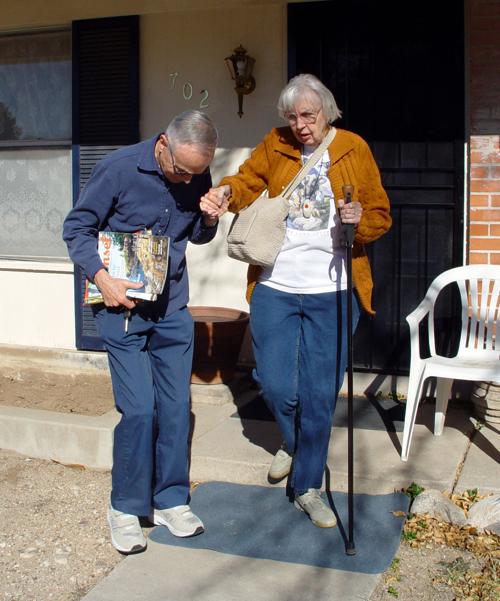While taking care of a family member or close friend is one of the greatest gifts a person can give, it often results in high levels of stress and loss of self for the caregiver. One in every five people in the United States is currently a caregiver, and the majority are women.
Did you know?
- That caregivers report having health problems almost twice as often as non-caregivers?
- That half of those caregivers spend 10 percent of their income on caregiving expenses?
- That up to 70 percent of caregivers suffer from depression or isolation or both?
- That many caregivers are unaware of the educational resources that exist to help support them?
Family caregiving specialists at the Pima Council on Aging say caregiving is today’s issue, just as child care was in the 1980s. Employers also need to recognize and accommodate the reality that so many workers today have significant caregiving responsibilities at home.
An important aspect of becoming a caregiver is to remember to give yourself support and be open to social interactions through support groups. PCOA Help Line staff members are information specialists who will listen and share local resource materials for and about self-care and for temporary relief or respite care. It’s a chance to refresh the relationships between you and the person receiving care.
When you take care of yourself, you are better able to help the person needing your love and support.
Next month, my siblings and I will be deep in reflection as we remember the passing of our 98 -year-old father last January, after nearly 14 years of caregiving shouldered by my brother and his wife who offered and took the primary responsibility of caregiving. They took it on fearlessly with loving kindness, patience, tenacity and good humor.
My sister took the lead as long-distance caregiver par excellence. I settled into the role of shorter-distance caregiver who regularly offered to “drive over” to the high desert of New Mexico for regular visits with Dad, and often just to give them a break.
Our journey is like so many other stories about the dynamics of wading into family caregiving. Along the way, each of us found meaningful ways to appreciate the smallest tasks. Each of the adult children found a specific way to contribute to shouldering the tasks while also finding ways to take care of ourselves.
No small measure of the journey is literally about learning how to complete fundamental caregiver tasks that many of us may take for granted. A host of activities of daily living, done correctly, are critical, repeated tasks, such as transfer from chair to bed, bathing, changing clothing and more.
The demands of caring for a loved one can be stressful, and it is difficult to provide care when you are unsure of what you are doing. That’s why the Pima Council on Aging, in partnership with Lutheran Social Services of the Southwest, offers a one-day training of two sessions specifically for unpaid family caregivers.
The training workshops are available every month. The training is free and the topics covered in the two sessions are designed for those who are caring for someone age 60 or older or someone who has Alzheimer’s or a related dementia of any age.
To register and get details about the January Family Caregiver Training on Wednesday, Jan. 10, contact Lutheran Social Services of the Southwest at (520) 514-7642 (Ext. 201) or email jbrowne@lss-sw.org
Another aspect of the journey is taking care of yourself and relating to other family caregivers who join a PCOA Caregiver Support Group.
Family Caregiver Support Groups
The Pima Council on Aging’s Family Caregiver Support Groups are open to anyone providing care for a person age 60 and older, or for someone with Alzheimer’s disease or a related dementia at any age. These groups are available at several locations throughout Pima County.
- There is no charge to attend.
- Call 609-1271 for pre-registration for a caregiver who is attending a group for the first time.
If you are a family caregiver, there is no charge to attend these workshops.
PCOA Family Caregiver Support Group locations throughout Pima County are online at www.pcoa.org/family-caregivers/caregiver-support-groups
Family Caregiver Training — Free Workshops
- The January Family Caregiver Training Workshop is at Armory Park Center, MPR Room, at 222 S. Fifth Ave. The one-day training is provided in two, back-to-back sessions: 9 a.m.-12:30 p.m. and 1-4 p.m., Wednesday, Jan. 10. Family Caregiver Training schedules are online at PCOA at www.pcoa.org/family-caregivers/caregiver-training
The Family Caregiver Training is provided in two sessions:
Workshop I
- Basic Infection Control and Prevention
- Stress Management
- Home Environment Safety
- Psychological and Emotional Conditions
- Dementia-Specific Care
- Grief and End of Life Issues
- Activity Planning
- Transfers and Positioning
- Personal Care
- Communication Skills
- Nutrition and Food Preparation
- Fall Prevention
- Communication Techniques
- Alzheimer’s and Related Dementias
- Communication Techniques
Workshop II — Hands-on Training
- Basic Infection Control and Prevention
- Proper Body Mechanics
- Evacuation and Fire Safety
- Nutrition and Assisting with Eating and Redirecting
- Transferring and Walking
- Use of Gait Belt
- Transferring out of Bed and in a Wheelchair
- Repositioning in Bed and in a Wheelchair
- Proper Bed Bath Techniques
- Catheter Bag Care
- Assisting, Positioning and Disposal of a Bed Pan
- Hygiene Care





